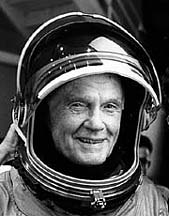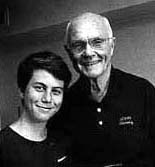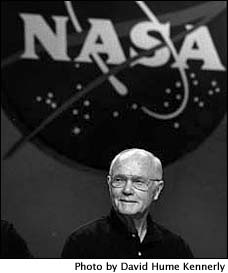 |
 |
 |
 |
 |

hope to accomplish in space?" |
 The
old hero! What an idea! Not an older person who was formerly great, like
a De Gaulle or a DiMaggio or a Golda Meir, but an active hero in old age.
Fiction gives us such characters from time to time, but reality is too
real. The flesh-and-blood old hero may need a special logic to return to
the field of conquest. Try this on for size: So much of space exists in
the past (dead stars shine). Why shouldnt someone be able to retrieve the
past in the future and be young again by being old?
The
old hero! What an idea! Not an older person who was formerly great, like
a De Gaulle or a DiMaggio or a Golda Meir, but an active hero in old age.
Fiction gives us such characters from time to time, but reality is too
real. The flesh-and-blood old hero may need a special logic to return to
the field of conquest. Try this on for size: So much of space exists in
the past (dead stars shine). Why shouldnt someone be able to retrieve the
past in the future and be young again by being old?
Whatever Glenn or any of his boosters say is the purpose of this mission, you and I know it is about romance and adventure and danger and the beauty of a person on a quest. The story-hungry mind is ageless too. And here is the old/new story of courage in a distant place, of daring and going. Never mind that the carpers call this mission useless. The public does not require a usefulness beyond its own admiring pleasure. As for the practicalities of the space program, it was never so useful as when it reminded the country of heroic capabilities.
In a time of little people consumed with little matters, here is a giant who is also a man. After the Challenger disaster, the fissures in the space program began to show, and when the people at NASA started to put the program back together, they shifted its appeal from the heroism of individuals to scientific cleverness - without success. Only last year's Pathfinder probe to Mars revived some of the keen attention people gave the space effort in the early 1960's. However entertaining it was to watch the cute little robot strut its stuff, it would always be the person in space who enthralled the public heart. All the old images that came back with Alan Shepards death a few weeks ago - the splashdown, the A-O.K.s, the Michelin tire man's space suits - connected to our favorite machines: ourselves.
And the attraction isn't only that it's a person out there; it's the aloneness. The person is always alone; no matter if he really is alone or not. He is Columbus, Lindbergh and Glenn in his original three-orbit flight. After the Friendship 7 flight in 1962, Glenn said it for everyone: "Now we can get rid of some of that automatic equipment and let man take over."
It
turned out then that he, taking over, had to fly the capsule by hand because
the automatic-control system, which fired the small jets designed to stabilize
the capsules position, failed. The man had to take over too when dealing
with the apparent threat that the heat shield had come loose, which meant
that if it were to separate completely on re-entry, Glenn would be devoured
in a flood of flames. The warning signal proved false, but Glenn and the
people back at NASA could not know that, so men had to alter re-entry procedures.
But America's man also saw space for the first time, for himself and for the waiting world. After the first light of dawn, he later wrote, "I was checking the instrument panel, and when I looked back out the window, I thought for a minute that I must have tumbled upside down and was looking up at a new field of stars. Then I looked again. There, spread out as far as I could see, were literally thousands of tiny, luminous objects that glowed in the black sky like fireflies. I was riding slowly through them, and the sensation was like walking backward through a pasture where someone has waved a wand and made all the fireflies stop right there where they were and glow steadily."
Sailing over the Indian Ocean, he reported on nightfall, "As the sun goes down, its very white, brilliant light, and as it goes below the horizon, you get a very bright orange color. Down close to the surface, it pales out into sort of a blue, a darker blue, and then off into black."
And the earth reported back. In Australia, the citizens of Perth had prepared a greeting that would also serve to test his night vision. Porch lights beamed. People spread sheets on their lawns to reflect the light. Taxi drivers flicked their headlights. Glenn radioed astronaut Gordon Cooper at the tracking station in Muchea, asking what the flicking lights were. When told, he said, "Thank everyone for turning them on, will you?" It was always about people. The feat was important, but never as important as the sense of the person who accomplished the feat.
In The Right Stuff, Tom Wolfe portrays Glenn as weird for his normality, but most American heroes are weirdly normal. Glenns physical appearance, then more than now, was strangely hard: Homo americanus stripped down, tight, hairless, a model of the species built for testing. Biographers stressed his down-homeness at a time before the late 1960s when down-homeness was not criminalized. He came from Presbyterian New Concord, Ohio; his dad ran a Chevrolet dealership; he attended Muskingum College, where he got B's and was substitute center of the football team. He played the trumpet too loudly in the town band; he saluted the flag and married Annie, the dentist's daughter and his sweetheart since the days they first met in a playpen; he did not swear.
But a flake was rising somewhere in that noble mix. In 1957 there was John Glenn on television, teamed with Eddie Hodges, the 10-year-old star of The Music Man, winning $12,500 on Name That Tune. (One tune he named was Far Away Places.) Earlier that year, there was Glenn sitting in an F8U Crusader jet, flying from Los Angeles to New York City and setting a cross-country speed record of 3 hr. 23 min. To this day he drives only convertibles. The American hero blares his trumpet and flies at speeds that can tear his head from his shoulders. At 77, he hankers for space.
One wonders why he does, after all these years in the U.S. Senate and a presidential run and a life of modest, quiet success. For more ordinary men, motives would hardly be mysterious. In 1985 I was a semifinalist in the Journalist-in-Space program. (Here, feel free to remark that it would please you to see all journalists shot into space.) After Challenger, the semis were as far as the competition went. Interviewed at Penn State, I had no trouble explaining why I wanted to be chosen: to go where no journalist had gone, to write about a wholly new experience. Age hardly mattered to me; I was 44. But it did not matter either to my fellow semifinalist Walter Cronkite, who, I am sure, was impelled by the same desire to tell a good story.
For the old hero Glenn, however, going back into space must have a more complicated meaning, one he has perhaps not worked out fully himself. One reason certainly has to do with getting out of Washington, a good idea under any circumstances. Then there is the prospect of going on a mission that stands the chance of accomplishing something; Congress's orbits are less picturesque. It must be nice to contemplate work with comrades where lives depend on lives. All that must drive him, and the danger of course. When one grows older, it's useful to have a little danger back, to run counter to all the impulses for safety that come with being weaker and breakable.
But for Glenn, who knows? He is not an ordinary man, and while it is easy to ascribe to him such low-energy motives as regained glory, he may have a private purpose in taking this flight. He is a genuine hero, after all; that is who he is. He may wish to return to the only country where he feels like himself.
"I could see a few stars even by day against the black sky," he wrote after his original voyage. "I observed them best at night, and I was roughly able to determine my position with reference to familiar groups such as Orion or the Pleiades. Each time around, I noticed a strange phenomenon. The stars shone steady as they neared the horizon. Then they dimmed for a bit. But the stars brightened again before actually setting. They appeared to be passing through a layer of haze about six to eight degrees above the earth and two degrees thick." A man who has lived among the stars may feel he belongs there.
As for us earthbound, it should feel good to rise vicariously off the planet with him again and to take a ride where youth and age meet, and the sky is endless, and the world looks clean, bright and valuable.
Roger Rosenblatt is a contributing editor
for TIME MAGAZINE. This essay is made
available to the readers of The Digital Journalist courtesty of Roger
and TIME.
| Previous
Page |
| Contents | Editorial | The Platypus | Links | Copyright |
| Past Features | Camera Corner | War Stories | Dirck's Gallery | Comments |
| Issue Archives | Columns | Forums | Mailing List |